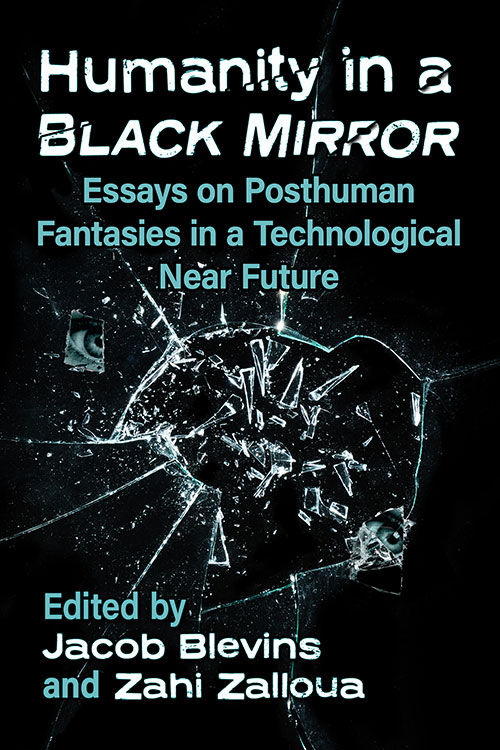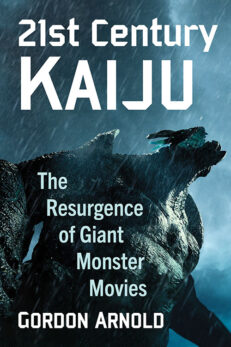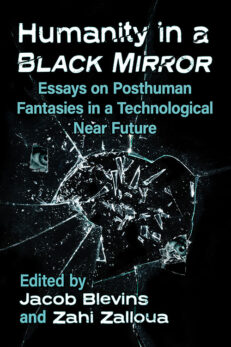Humanity in a Black Mirror
Essays on Posthuman Fantasies in a Technological Near Future
Original price was: $39.95.$19.99Current price is: $19.99.
In stock
About the Book
The presentation of technology as a response to human want or need is a defining aspect of Black Mirror, a series that centers the transhumanist conviction that ontological deficiency is a solvable problem. The articles in this collection continue Black Mirror‘s examination of the transhuman need for plentitude, addressing the convergence of fantasy, the posthuman, and the dramatization of fear. The contributors contend that Black Mirror reveals both the cracks of the posthuman self and the formation of anxiety within fantasy’s empty, yet necessary, economy of desire. The strength of the series lies in its ability to disrupt the visibility of technology, no longer portraying it as a naturalized, unseen background, affecting our very being at the ontological level without many of us realizing it. This volume of essays argues that this negative lesson is Black Mirror’s most successful approach. It examines how Black Mirror demonstrates the Janus-like structure of fantasy, as well as how it teaches, unteaches, and reteaches us about desire in a technological world.
About the Author(s)
Bibliographic Details
Edited by Jacob Blevins and Zahi Zalloua
Format: softcover (6 x 9)
Pages: 210
Bibliographic Info: notes, bibliography, index
Copyright Date: 2023
pISBN: 978-1-4766-8382-9
eISBN: 978-1-4766-4712-8
Imprint: McFarland
Table of Contents
Introduction: Traversing the Fantasy of Technology
Zahi Zalloua and Jacob Blevins 1
The Utopia of the Mirror: Angst, the Uncanny, and the Postmodern Mise en abyme
Robert T. Tally, Jr. 19
Paroxysm Politics
Peter Hitchcock 33
The Way the Cookie Doubles: Cripping the Cyber-Gothic of Black Mirror’s AI Tech
Whitney S. May 48
“Men Against Fire,” MASS, and Morality
Melina Constantine Bell and Nathaniel Goldberg 69
On the Government of Children: Visions of the Politics of Parenting from Plato to Deleuze in Black Mirror’s Arkangel
Jeffrey R. Di Leo 86
The Question(ing) Concerning (Anti-)Black-Technology: Inhabiting the Crack of Black Being Through the (Pyro-)Techno-Poethics of “Black Museum”
Andrew Santana Kaplan 109
Paranoia as Reparation in “Black Museum”
Nicole Simek 130
Trolling the Audience: Bandersnatch, Coercion, and Posthuman Capacities
Paul Muhlhauser, Sera McClintock, and Gianna D’Avella 145
Glass Walls and Unmasked Others: Anxiety
and the Commodification of Desire in “Nosedive”
Jacob Blevins 159
Sexuality and the Real in “Striking Vipers”
Zahi Zalloua 170
Conclusion
Jacob Blevins and Zahi Zalloua 185
Bibliography 189
About the Contributors 199
Index 201
Book Reviews & Awards
• “The speculative quality of the television series Black Mirror begs for a sustained theoretical analysis. Jacob Blevins and Zahi Zalloua have not only provided one but have produced a work that unlocks all the mysteries of the show and makes clear to everyone why they were interested in it in the first place. For anyone who has seen even one episode of Black Mirror, their book is simply required reading. It’s as if the series were invented just so that we could have this collection of remarkable interpretations that make clear the theoretical underpinnings of what we’ve seen.”—Todd McGowan, University of Vermont
• “An exciting and accessible assessment of the TV series. Weaving through questions of ethics, morality, race, sexuality, and desire. This book shows how Black Mirror provides cognitive mapping for our technological society. A pleasure to read and will delight anyone impressed by the vivid and familiar depictions, the dark sides and intrigues, of the digital world portrayed in Black Mirror.”—Matthew Flisfeder, author of Algorithmic Desire: Toward a New Structuralist Theory of Social Media
• “Humanity in a Black Mirror argues that this already ubercanonical anthology series, somewhat contrary to its popular reputation, empowers its audience to ‘traverse the fantasy’ of posthuman transformation of the self and society even as it shocks, horrifies, and disgusts us—showing how technological innovation is always a drama of attraction and revulsion, and sometimes both at the same time. It is a must-read volume for anyone interested in one of the most important and most influential science fiction shows of the twenty-first century.”—Gerry Canavan, president of the Science Fiction Research Association, associate professor and chair of English, Marquette University





